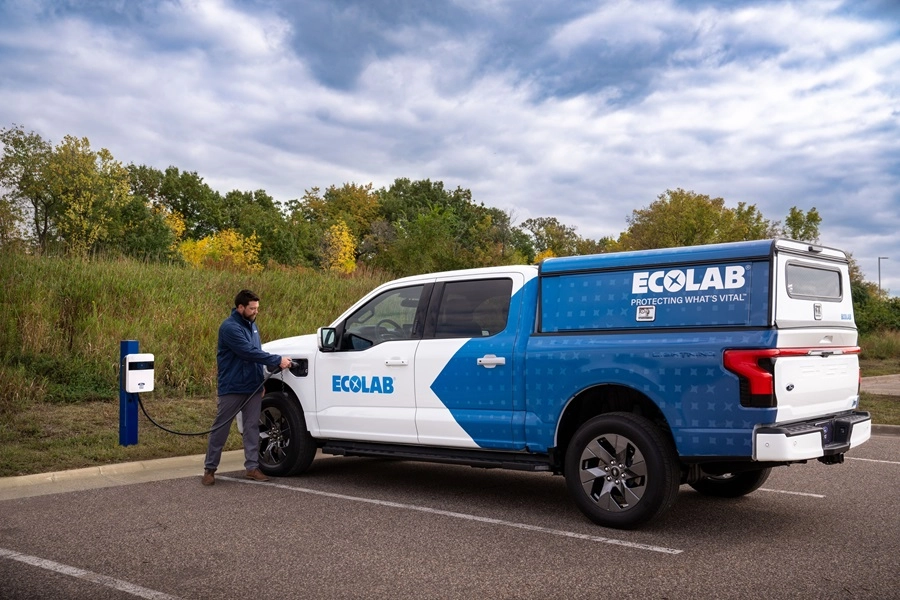In a monumental move towards sustainability, Ecolab, a global leader in water, hygiene, and infection prevention solutions, has partnered with Ford Pro, Ford’s commercial division, to expedite the electrification of its sales and service fleet.
This strategic alliance aims to achieve complete electrification of Ecolab’s North American fleet by 2030, reinforcing their commitment to positive environmental impacts, carbon neutrality, and sustainable growth.
The roots of collaboration between Ecolab and Ford, planted nearly a century ago, are now flourishing with a shared vision for a greener future.
The electrification journey commences in California, where Ecolab plans to convert its sales and service vehicles to electric vehicles by 2025.
The company is set to acquire and deploy over 1,000 Ford F-150 Lightning Pro trucks and Mustang Mach-E SUVs, forming what is anticipated to be the largest all-electric sales and service fleet in California.
To support this transition, Ford Pro offers a comprehensive suite of charging and telematics software, empowering Ecolab to optimize vehicle performance and enhance fleet productivity.
This shift towards EVs marks a pivotal step in Ecolab’s ambitious goal of achieving net-zero emissions globally by 2050.
Ted Cannis, CEO of Ford Pro, emphasizes the historical collaboration, stating, “Ford and Ecolab have worked closely for almost 100 years, from water conservation at Ford now to electrification at Ecolab. Together, we’re showing that sustainability is good for the bottom line and the environment.”
A Historic and Sustainable Collaboration
The relationship between Ford and Ecolab dates back to 1925, initially focusing on water conservation initiatives in Ford manufacturing plants.
Currently, the company operates a fleet of over 10,000 light-duty vehicles in North America, with 95% being Ford vehicles.
Over the past decade, the firm has purchased more than 31,000 Ford vehicles.
Christophe Beck, Chairman and CEO of Ecolab, highlights the rich history of collaboration, stating, “This next phase of our relationship will help us move quickly and at scale with the goal of improving profits through renewable energy and EV solutions for the betterment of our employees, business, and the environment.”
Sustainability is integral to both Ford’s and Ecolab’s operations, aligning with their shared commitment to achieving carbon neutrality by 2050.
Leveraging water conservation practices and technology, Ford has significantly reduced water usage in its manufacturing, contributing to freshwater availability in local communities.
Since 2000, Ford has saved more than 186 billion gallons of water, working towards using only fresh water for human consumption.
Major Business and Environmental Benefits
Ecolab anticipates significant cost savings through the electrification initiative, with internal financial models projecting a lower total cost of ownership over the life of the vehicles compared to traditional internal combustion engine (ICE) vehicles.
The move to electric vehicles is expected to yield approximately 50 per cent lower annual fuel costs per 2023 F-150 Lightning Pro truck, translating to savings of about 1,400 dollars in fuel per vehicle each year.
Once deployed, Ecolab plans to leverage Ford Pro productivity software and service solutions to efficiently manage and maintain its California fleet.
This strategic collaboration not only signifies a bold step towards a sustainable future but also sets a precedent for businesses to embrace eco-friendly practices for long-term profitability and environmental well-being.
Ted Cannis, Ford Pro CEO, acknowledges the broader significance of this collaboration, stating, “We are not just providing vehicles to Ecolab; we are collaborating to drive meaningful change in the automotive landscape.
“This partnership exemplifies how businesses can join forces to address environmental challenges while fostering innovation and economic growth.”, he adds.
The journey towards a 100% electric fleet in California by 2025 is a tangible manifestation of the transformative power of strategic partnerships in the pursuit of a sustainable future.
Read More: “Mazda reaches an agreement with Tesla to adopt NACS for future North American BEVs”







